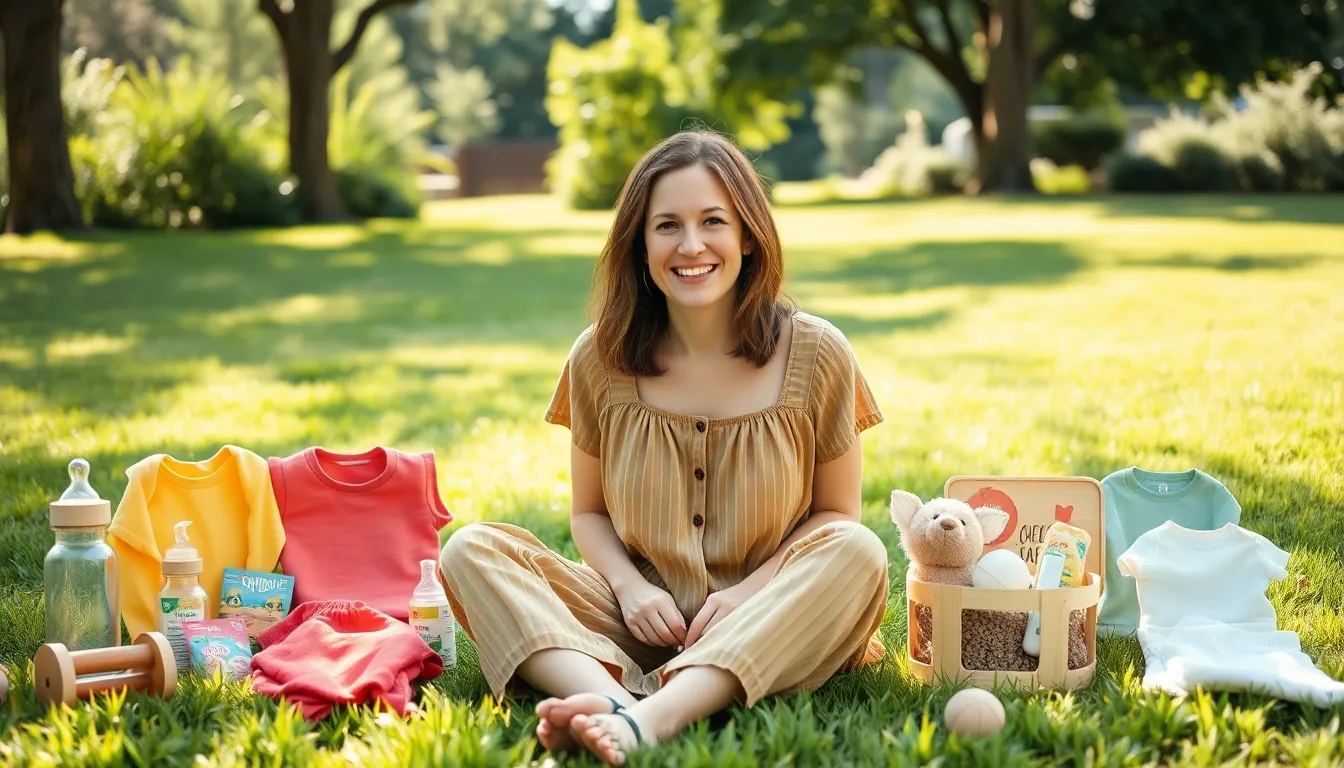Table of Contents
ToggleIn a world where baby wipes can outlive your toddler’s favorite toy, eco-friendly baby products are like a breath of fresh air—or should we say, a whiff of organic cotton? Parents today are on a quest for greener options that won’t just protect their little ones but also the planet. After all, who wants to raise a future environmentalist with a stash of plastic toys that could survive a zombie apocalypse?
What Are Eco-Friendly Baby Products?
Eco-friendly baby products feature sustainable design and materials that prioritize health for both children and the planet. Parents increasingly seek these items to ensure a safer environment for their children while reducing their ecological footprint.
Definition and Importance
Eco-friendly baby products emphasize sustainability and safety. These products avoid harmful chemicals and toxins, minimizing exposure risks for infants. Selecting such items supports environmental preservation by reducing waste and pollution. Parents play a crucial role in fostering eco-conscious habits through their choices, shaping a generation more attuned to sustainability.
Common Materials Used
Various materials comprise eco-friendly baby products. Organic cotton stands out for its softness and absence of toxic pesticides. Bamboo offers durability and natural antibacterial properties, making it ideal for clothing and accessories. Other materials like hemp and recycled plastics also contribute to sustainable practices, providing parents with safe options for toys and nursery items. Utilizing these materials promotes a healthier environment for future generations.
Types of Eco-Friendly Baby Products

Eco-friendly baby products encompass various categories that prioritize health and sustainability. Parents can choose from an array of options to ensure a greener, safer environment for their children.
Clothing and Fabrics
Eco-conscious clothing options include organic cotton onesies and bamboo sleep sacks. These materials reduce chemical exposure and avoid harmful dyes. Sustainable production methods enhance the safety and comfort of fabrics. Parents can find certified organic baby clothing that meets strict environmental standards. Selecting clothing from these materials helps in raising awareness about eco-friendly choices in children’s fashion.
Diapers and Wipes
Cloth diapers serve as a popular alternative to disposables, significantly cutting down on waste. Biodegradable disposable diapers also feature eco-friendly materials that break down more easily. Parents often choose plant-based wipes free from harsh chemicals to ensure gentle cleaning. Selecting these products leads to fewer toxins in topical applications. A variety of brands offer sustainable options that protect both a baby’s skin and the environment.
Feeding Products
Glass bottles and stainless-steel containers are excellent eco-friendly feeding options. These materials eliminate the risk of harmful chemicals leaching into food and liquids. Many parents opt for silicone bibs and utensils, which offer a safe, reusable alternative to plastic. Choosing organic cotton bibs ensures babies stay clean without exposure to synthetic fibers. Sustainable feeding products promote healthy habits from an early age.
Toys and Accessories
Wooden toys made from sustainably sourced materials provide safe play options without plastics. Organic cotton stuffed animals avoid harmful chemicals, ensuring safety for infants during playtime. Parents often look for biodegradable or recycled materials in accessories like diaper bags. Selecting these eco-friendly toys and accessories nurtures a child’s natural curiosity while caring for the environment. Many companies emphasize sustainability in toy production, making it easier to find options that align with eco-conscious values.
Benefits of Using Eco-Friendly Baby Products
Eco-friendly baby products offer numerous advantages for both infants and the environment. Incorporating these items into daily life promotes health and sustainability.
Health Benefits for Babies
Using eco-friendly baby products minimizes exposure to harmful chemicals. Organic cotton, for example, avoids pesticides and toxic dyes, ensuring safer clothing and bedding. These products also reduce the risk of skin irritation and allergies. Parents benefit from peace of mind knowing they provide safer options for their children’s health. Enhanced comfort comes from materials that breathe better and are softer on delicate skin.
Environmental Impact
Eco-friendly baby products contribute positively to the planet. Biodegradable diapers and reusable cloth options significantly reduce landfill waste. Sustainable materials like bamboo and organic cotton require fewer resources compared to conventional textiles. Choosing these products helps lower carbon footprints and decreases pollution. By selecting eco-friendly options, parents support manufacturers committed to reducing environmental harm and promoting sustainability.
Cost-Effectiveness
Investing in eco-friendly baby products can lead to long-term savings. Cloth diapers, although pricier up front, can be reused for multiple children, cutting overall expenses. Durable materials save money as they outlast traditional items. Many eco-friendly options also feature multi-use capabilities, such as bottles that convert as children grow. In the long run, selecting sustainable products reduces the financial burden on families while benefiting the environment.
Tips for Choosing Eco-Friendly Baby Products
Choosing eco-friendly baby products involves careful consideration of materials and certifications. Parents can ensure they’re selecting safe options by looking for recognized standards.
Certifications and Labels to Look For
Certifications serve as a reliable guide when selecting eco-friendly baby products. Look for labels such as GOTS, which guarantees organic textiles meet strict environmental and social criteria. Oeko-Tex Standard 100 indicates products free from harmful substances. Additionally, USDA Organic certification confirms that materials, like cotton, are grown without synthetic pesticides. Non-Toxic Certified labels, available on various toys, assure minimal exposure to hazardous chemicals. These guides help parents identify products prioritizing health and sustainability.
Brand Recommendations
Several brands excel at providing eco-friendly baby products. Bambo Nature offers biodegradable diapers that balance functionality with environmental responsibility. Naturepedic specializes in organic mattresses, ensuring a non-toxic sleeping environment. For clothing, Babysoy focuses on sustainable fabrics like soy and organic cotton. Brands like Green Toys produce safe, durable toys using recycled plastics. Many companies emphasize eco-friendly production methods, making them suitable choices for conscientious parents. Opting for these brands supports sustainability while offering safe baby products.
Choosing eco-friendly baby products is a meaningful step towards nurturing a healthier future for both children and the planet. By selecting items made from sustainable materials and avoiding harmful chemicals, parents can create a safer environment for their little ones.
Investing in these products not only promotes the well-being of babies but also fosters a sense of environmental responsibility from an early age. With a variety of options available across clothing, feeding, and toys, parents have the opportunity to make informed choices that align with their values.
Supporting brands committed to sustainability ensures a positive impact on the world while providing safe and durable products for their children. Eco-friendly baby products represent a thoughtful approach to parenting that prioritizes health and environmental stewardship.







